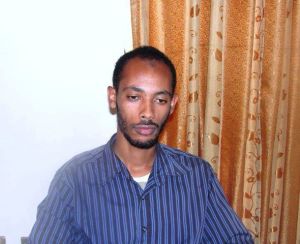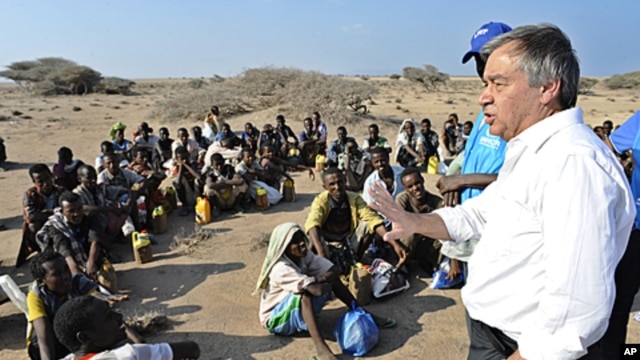They speak of democracy, but act violently to suppress dissenting voices and control the people through the inculcation of fear: they ignore human rights and trample on the people, they are a tyrannical wolf in democratic sheep’s clothing, causing suffering and misery to thousands of people throughout Ethiopia. The Ethiopian People’s Revolutionary Democratic Front (EPRDF) government repeatedly scoffs at international law and consistently acts in violation of their own Federal constitution – a liberal document written by the regime to please and deceive their foreign supporters. They have enacted laws of repression: the widely condemned Charities and Societies (ATD) law (CSO law) and the Anti Terrorism Declaration, which is the main tool of political control, together with the ‘Mass Media and Freedom of Information Proclamation’ they form a formidable unjust arsenal of government control. Freedom of the media (which is largely ‘state-owned’) is denied and political dissent is all but outlawed.
Against this repressive backdrop, the Semayawi (Blue) party, a new opposition group, organized peaceful protests on the 2nd June in Addis Ababa. Ten thousand or so people marched through the capital demanding the release of political prisoners, “respect for the constitution” and Justice! Justice! Justice! It was (Reuters 2/06/2013 reported), an “anti-Government procession…. the first large-scale protest since a disputed 2005 election ended in street violence that killed 200 people”, a ‘disputed election’ result that was discredited totally by European Union observers and denounced by opposition groups and large swathes of the population.
The Chairman of the Semayawi Party, Yilekal Getachew, told Reuters, “We have repeatedly asked the government to release political leaders, journalists and those who asked the government not to intervene in religious affairs”. In keeping with the recent worldwide movement for freedom and social justice, he stated that, “if these questions are not resolved and no progress is made in the next three months, we will organize more protests. It is the beginning of our struggle”. To the disappointment of many and the surprise of nobody, the government has made no attempt to ‘resolve’ the questions raised, and true to their word a second demonstration was planned for 1st September in Addis Ababa. In the event, as the BBC report, around “100 members of Ethiopia’s opposition Semayawi (Blue) party were arrested and some badly beaten”, and “equipment such as sound systems were confiscated”, ahead of the planned rally, which was banned by the EPRDF. Government justification formed, and a cock and bull story was duly constructed with Communication Minister Shimeles Kemal stating “the venue [for Semayawi’s event) had already been booked by a pro-government group condemning religious extremism”.
Non-interference in religious affairs is one of the key demands of the Semayawi party, a demand based upon the constitutional commitment of religious independence from the State, which Muslim groups claim the government has violated. Enraged by government interference in all matters religious, the Muslim community have organised regular small-scale protests and sit-ins in the capital for the last two years. In early August, Reuters 8/08/2013 reported “Demonstrators chanted "Allahu Akbar" and hoisted banners that read "respect the constitution", referring to allegations that the government has tried to influence the highest Muslim affairs body, the Ethiopia Islamic Affairs Supreme Council”. Around 40% of Ethiopia’s population (around 85 million) are Muslim, for generations they have lived amicably with their Orthodox Christians neighbours, who make up the majority in the country; they are moderate in their beliefs and peaceful in their ways. The EPRDF in contrast are violent, intolerant and ideologically driven; ‘Revolutionary Democracy’ being the particular tune to which the democratic dictatorship hums and drums its partisan rule.
“Name-Calling”
The government’s response to the peaceful demonstrations, has unsurprisingly been intolerant and dismissive; their comments inflammatory and predictable, stating Mail@Guardian 14/07/2013 record, "most of these demonstrators are Islamic extremists”, and showing their own ‘extreme’ tendencies, authoritively declaring that “the protesters aimed to set up an Islamic state in the country and were bankrolled and guided by "extremists" [this time] overseas”. Duplicitous nonsense, which serves to distract attention from the underlying issues being raised and the imperative (and legal requirement) for the government to act in accordance with its own constitution.
Along with such disingenuous comments the regime has responded to the protests in a repressive manner; imprisoning Muslims calling for justice, causing Amnesty International 8/08/2013 to be “extremely concerned at reports coming out of Ethiopia… of further widespread arrests of Muslim protesters”, Amnesty demand that the “on-going repressive crackdown on freedom of speech and the right to peacefully protest has to end now”. Despite the fact that the protests have been peaceful and good-natured the regime has consistently described the protesters as violent terrorists, in February the ‘Holy War Movement’ was shown on State Television, it presented protestors and those arrested (including journalists), as terrorists. And in a clear violation of people’s constitutional right to protest, the regime has threatened to take firm action against further protests.
Whilst the majority of actions during the last two years have been without incident, protests in Kofele in the Oromia region on 8th August ended in “the deaths of an unconfirmed number”, there have also been reports of large numbers of people being arrested in Kofele and Addis Ababa, including two journalists. Following the Kofele deaths Amnesty called for “an immediate, independent and impartial investigation into the events in Kofele, as well as into the four incidents last year which resulted in the deaths and injuries of protestors”. Legitimate demands which the regime has duly ignored.
The EPRDF does not tolerate any independent media coverage within the country and indeed does all it can to control the flow of information out of Ethiopia and restrict totally dissenting voices. And they don’t care who the journalist is working for, key allies or diaspora media; In October 2012 a reporter from the Voice of America (VOA) covering a protest in Anwar Mosque in Addis was arrested and told to erase her recorded interviews, the Committee to Protect Journalists (CPJ) report. This was not the first time a VOA journalist had been detained. “They are criminalizing journalism,” said Martin Schibbye a Swedish freelance journalist who was jailed [in 2011] along with a colleague for more than 14 months in Ethiopia”, for entering the Ogaden region. A heavily militarized area where wide ranging human rights violations constituting crimes against humanity are taking place, which has been hidden from the International media and aid organisations since 2007. Fearing imprisonment, many journalists have left Ethiopia, CPJ report that in 2012, along with Eritrea, it was were Africa’s ‘top jailer’ of journalists”, coming in eighth worldwide.
Unjust Laws of Control
In July last year, hundreds of protesting Muslims peacefully demanding that the government stop interfering in their religious affairs and allow them to vote freely for representatives on the Ethiopian Islamic Affairs Supreme Council (EIASC). Most were released, but 29 members of the protest committee were charged on 29th October under the universally criticized Anti Terrorist Declaration (ATD), accused of “intending to advance a political, religious or ideological cause” by force, and the “planning, preparation, conspiracy, incitement and attempt of terrorist acts.” Their arrest has been slammed by human rights groups as well as the United States Commission on religious Freedom, who “are deeply concerned that Ethiopia’s government is seeking to silence peaceful religious freedom proponents by detaining and trying them in secret under trumped-up terrorism charges. They should be released now and their trials halted”. The men claim to have been “tortured and experienced other ill-treatment in detention”.
The ambiguous ATD was introduced in 2009 and has been used by the Ethiopian government, “to severely restrict basic rights of freedom of expression, association, and assembly”, Human Rights Watch (HRW) state. It violates dues process, which like a raft of other internationally recognized and legally binding rights, is enshrined in the Ethiopian constitution. The legislation cause outrage amongst human rights groups and the right minded when it was proposed. HRW (30/06/2009) said of the draft law, (which un-amended found its way onto the statute books) that it would “permit the government to repress a wide range of internationally protected freedoms”, – precisely the reason for it’s introduction, and it provides “the Ethiopian government with a potent instrument to crack down on political dissent, including peaceful political demonstrations and public criticisms of government policy”.
The unjust law allows for long-tem imprisonment and the death penalty for so called crimes that meet some EPRDF definition of terrorism, and denies in some cases a defendants right to be presumed innocent – the bedrock of the international judicial system. Torture is used without restraint by the military and police, under the ATD evidence obtained whilst a prisoner is being beaten, hanged, whipped or drowned is admissible in court, this criminal act contravenes Article 15 of the United Nations Convention against Torture (ratified by Ethiopia in 1994), which ‘requires that any statement made as a result of torture is inadmissible as evidence’. Terrorism is indeed an issue of grave concern in Ethiopia, it is not rooted in the Muslim community, the media, the Blue Party or the Universities, it is State Terrorism that stalks this land, that kills and falsely imprisons, tortures and rapes the innocent, it is the EPRDF; the rebel group that ousted a communist dictator in 1991 only to take up his tyrannical mantle, who manipulate the law to serve their repressive rule and who violates a plethora of human rights, consistently and with impunity. Ethiopia’s donors and international friends, (primarily America and Britain) have other, larger fish on their minds, and even though they give the country over a third of its federal budget they seem unconcerned by the criminality being committed, much of which is taking place under the cloak of development. Violent rule however is a storm that is imploding throughout the world, the people, who have suffered long enough, sense their collective strength and are awakening.
Need for Unity
Although completely contrary to the EPRDF’s pledge of Ethnic Federalism, divide and rule is the effective methodology of division employed by the regime. In a country with dozens of tribal groups, various ethnicities and different religious beliefs (Islam and Christianity), unity is the key to any popular social revolution, much needed and ardently longed for by millions throughout the land. We are witnessing a worldwide protest movement for change; age-old values of freedom, equality and social justice, brotherhood and peace are the clarion call of many marching and protesting. And so it is in Ethiopia, the Blue party and other opposition groups, the Muslim community and the students on the streets demanding Justice! Justice! Jusitce! are in harmony with the rhythm of the times. Out of step and blind to the needs of the people and their rightful demands, the ruling party acts with violence to drown out their voices and suppress their rights: in Addis Ababa, where thousands marched in June, in Oromia and the Ogaden, where the people seek autonomy, in Amhara, where thousands have been displaced, in Gambella and the Lower Omo Valley, where native people are being driven off their ancestral land into state created villages, women raped and men beaten.
Unity is the song of the day, rich with diversity united in intent, the collective will of the people of Ethiopia and indeed throughout the world is an unstoppable force for change. All steps need to be taken to remove the obstacle to the realization of unity throughout the country, ethnic prejudices and tribal differences; all need to be laid aside. The Ethiopian regime may succeed in subduing the movement for change that is simmering throughout the country, however with sustained unified action, peacefully undertaken and relentlessly expressed, freedom and social justice, longed for by millions throughout the country, will surely come.
=========================================================================
*Graham Peebles is director of the Create Trust. He can be reached at: graham@thecreatetrust.or












